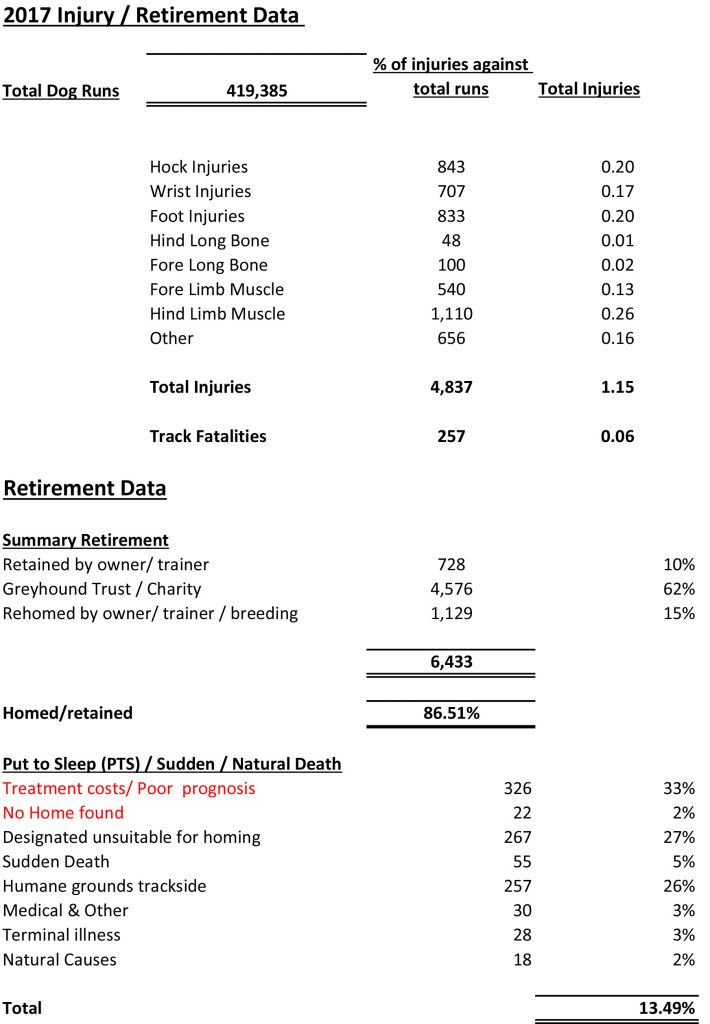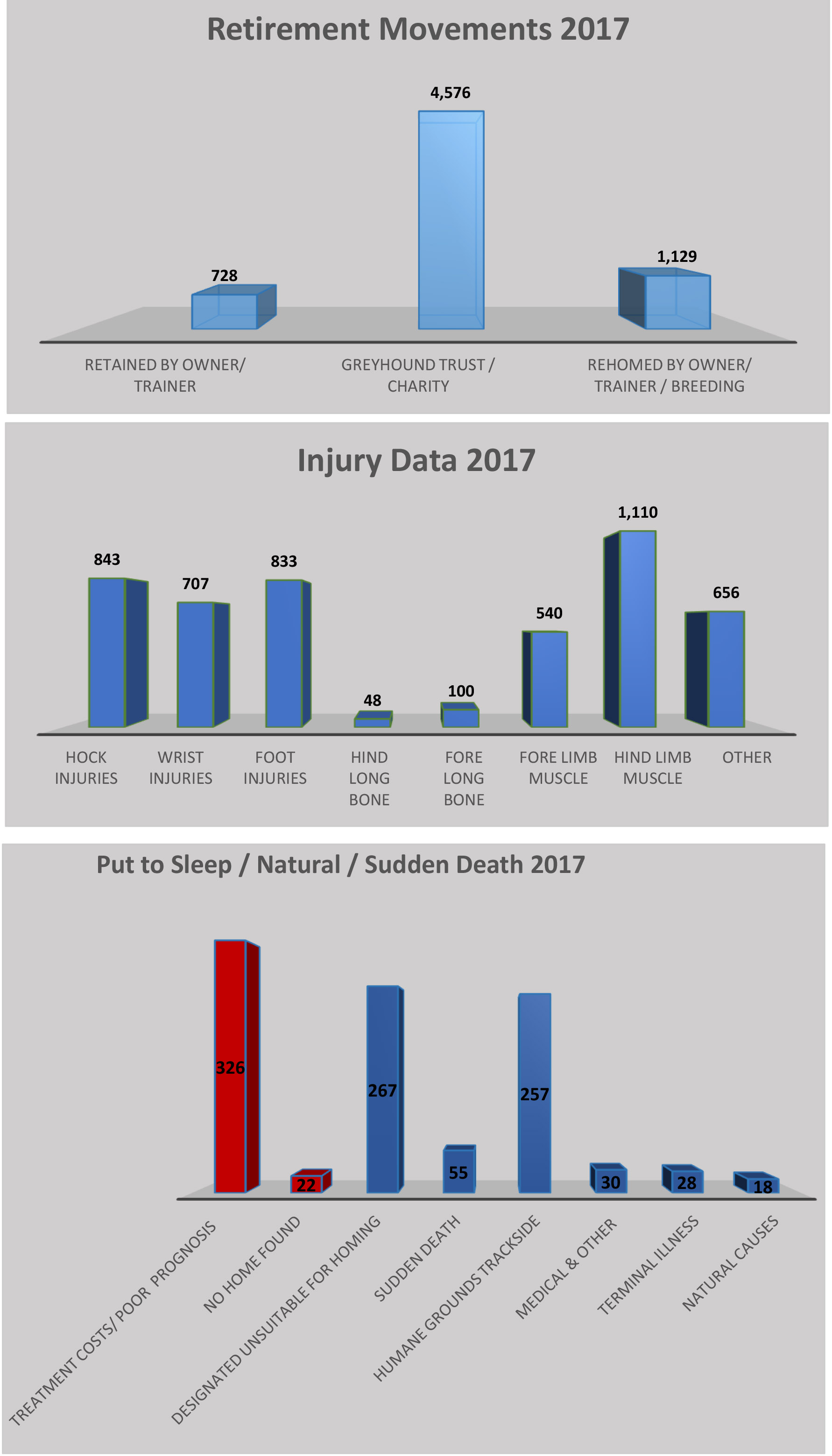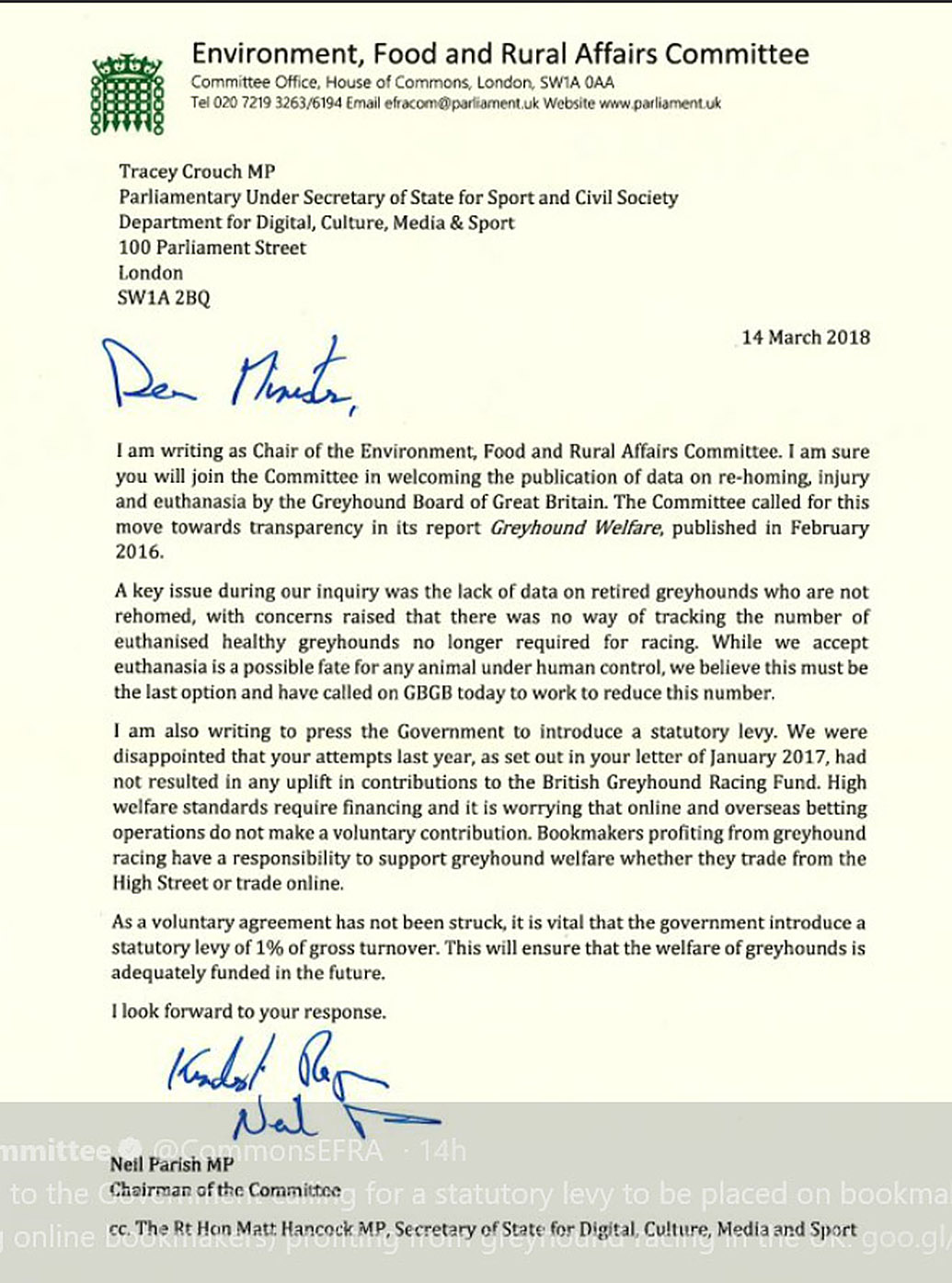The Greyhound Board of Great Britain have today released the injury and euthanasia data for all greyhounds to have raced in 2017.
How it will be received will depend much on the individual assumptions and claims made about the fate of racing greyhounds.
The figures for the annual number of broken hocks and track side euthanasias have been available on the DEFRA website for many years. These are more detailed figures, compiled by the track vets, as well as all the follow-up information collated by the Board’s own integrity and regulation department.
It shows 257 track side fatalities, around 11 per track, though three tracks have since closed. They were from around 400,000 race performances, giving greyhound racing a mortality rate of around one third of horse racing.
It shows that 86% of ex-racers are re-homed, a figure that flies in the face of ‘anti’ propaganda.
The remaining 14 per cent included all fatalities including racing accidents and death relating to illness and natural causes.
The two areas – already highlighted by GBGB as being their biggest cause for concerns are the ‘treatment cost/poor prognosis’ and ‘no home found’.
These figure extensively in the Board’s Greyhound Commitment.

Greyhound Board of Great Britain Launches The Greyhound Commitment
The Greyhound Board of Great Britain (GBGB) is today launching The Greyhound Commitment, an 8 point agenda for their sport.
GBGB, which is responsible for the welfare and care of all racing greyhounds and regulates the successful and clean operation of the sport, has published The Greyhound Commitment setting out its expectations of how the sport and industry should be run with animal welfare at its heart. Greyhound racing is the sixth most popular spectator sport in the UK, attended by over 2 million people each year.
The Greyhound Commitment sets out a series of promises and initiatives that bring together what is already best practice in the sport for universal implementation across its 22 licensed tracks. Commitments range from introducing further safety measures at racing tracks, raising standards at residential kennels to providing training and development for the 7,000 people whose jobs depend on the sport.
Launching the Commitment, Mark Bird, Chief Executive of GBGB, will say:

“We are a country of animal lovers and sports lovers so it is vital that animal welfare is at the heart of greyhound racing. The Greyhound Commitment, which we are launching today, sets out our intent that every greyhound that can be homed when it retires is successfully homed.
“Greyhounds make calm, gentle and loveable pets that are excellent with children and are extremely affectionate. When they retire from racing, many greyhounds are kept on as pets by their owners, breeders or trainers.
“Charities such as our partner, The Greyhound Trust and others do amazing work in organising homes for greyhounds but there is more to be done to meet our mission of every greyhound that can be homed, being homed.”
Alongside The Greyhound Commitment, GBGB is publishing the annual statistics for greyhound injuries and retirements. The figures show that the UK sport has the lowest independently verified injury rates for the sport anywhere in the world.
In 2017, there were over 400,000 runs in greyhound racing in Great Britain. The racing injury rate was 1.15% – the lowest independently verified injury rate in the world. 257 dogs suffered racing fatalities, a rate of 0.06%, considerably lower than that of British horseracing at 0.18%.
Over the year, 86% of retiring greyhounds were successfully homed by charities or retained within the sport by owners, trainers or breeders.
Of the remaining 14%, the vast majority died or were put to sleep, following vets’ advice, for legitimate medical or welfare reasons; leaving 348 dogs that were unfortunately put to sleep because no suitable home could be found or because there was no viable alternative – such as because of the high cost of medical treatment.
Mark Bird said: “The publication of today’s data demonstrates the levels of care and attention already being provided to the welfare of dogs in our sport and proves that the overwhelming majority of greyhounds are successfully homed when they retire. But there were 348 dogs this year for whom no home could be found and our mission is to reduce this number to zero.
“We are dependent on the generosity of supporters of charities such as the Greyhound Trust and the voluntary contribution of the betting industry to maximise our ability to support and home all retired greyhounds. We are determined to meet this challenge so that every retired greyhound that can be homed is successfully homed.”
GBGB is also announcing progress in discussions with all the major UK bookmakers to increase the amount the sport receives each year to support welfare initiatives.
Mark Bird said: “We are close to having all the major bookmakers signed up to the voluntary levy which is a vital means of funding our welfare activities. Greyhound racing is an integral part of sports betting in this country and it is pleasing to see the bookmakers recognising their responsibility to making worthwhile contributions.”
Dr Simon Gower BVSc MRCVS, Veterinary Director of the Greyhound Board of Great Britain, said:
“Across the sport we are committed to the welfare of greyhounds as today’s figures show. The Greyhound Commitment is an excellent statement that sets out what all of us in the sport are doing and need to continue to do to ensure that welfare remains at the heart of our sport.”















